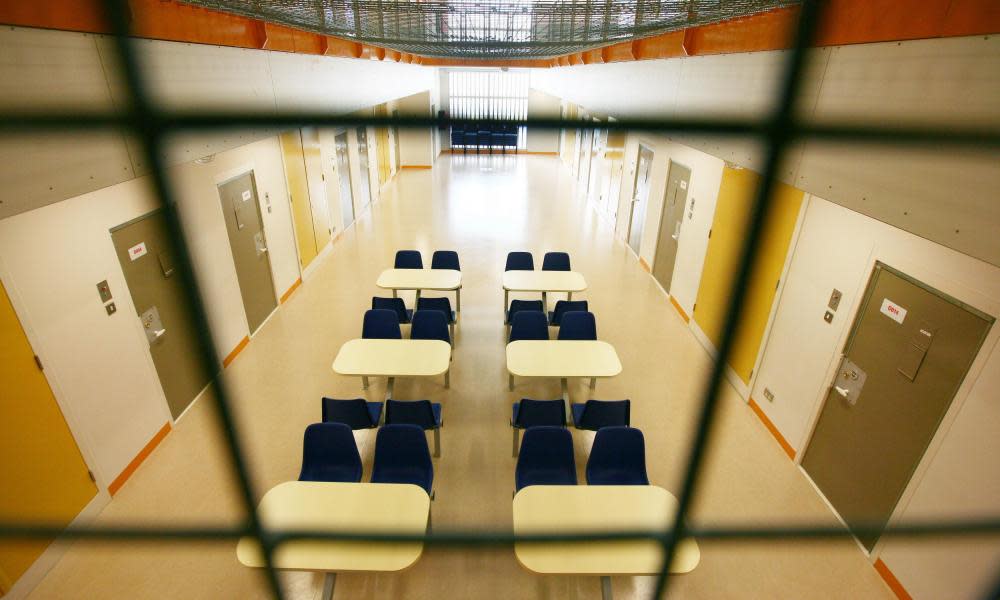Physical and verbal abuse found in Brook House immigration removal centre inquiry

The first public inquiry into abuses at a UK immigration detention centre has identified a “toxic culture” and numerous breaches of human rights laws relating to torture and inhuman or degrading treatment, as well as racist, derogatory language used by some staff towards detainees.
The inquiry calls for sweeping changes to immigration detention including the introduction of a 28-day time limit.
The 711-page Brook House inquiry report, published on Tuesday after more than three years of investigation, was ordered by the former home secretary Priti Patel, after BBC’s Panorama broadcast undercover footage of violence against and abuse of vulnerable detainees at Brook House immigration removal centre near Gatwick airport during a five-month period between April and August 2017.
The report has identified 19 instances where the inquiry chair, Kate Eves, found “credible evidence” of acts or omissions, which were capable of amounting to mistreatment under article 3 of the European convention on human rights that says no one shall be subjected to torture or inhuman or degrading treatment or punishment.
The most serious incident involved the application of pressure to a detainee’s neck while he was in extreme distress. Other incidents included the repeated use of an inherently dangerous restraint technique, handcuffing people with their hands behind their backs while seated, which had previously been associated with the death of an Angolan immigration detainee, Jimmy Mubenga, in 2010.
There were also instances of men being forcibly moved when they were naked or near naked.
Other issues identified included a “toxic” culture among the Home Office contractor G4S, which ran Brook House at the time of the BBC exposé, including the use of racist and derogatory language. However, the inquiry was also critical of G4S’s successor to the contract, Serco.
The inquiry identified “serious failings” in the application of safeguarding rules and procedures, which were found to be dysfunctional in a number of areas, and excessive use of force.
The report said some of the use of force techniques identified were used to provoke or punish people, with pain inflicted inappropriately and equipment such as riot shields and balaclavas being used in situations where this was inappropriate and intimidating.
Not enough was done to prevent use of the psychoactive drug spice.
The findings about healthcare provision were also damning with “evidence of a lack of empathy and, on occasion, a mocking approach to the men in their care”.
While the focus of the public inquiry’s evidence was on issues relating to the Panorama revelations it also looked at immigration detention more broadly and made 33 recommendations for urgent changes for the future, most significantly a time limit of 28 days.
Although immigration detention is for administrative purposes rather than as a punishment for a criminal conviction there is no time limit.
The inquiry calls for improvement of oversight of Home Office contracts and clarification of rules shown to have been regularly misused or misunderstood by staff. Another significant recommendation relates to use of force. It urges the Home Office to issue an immediate instruction to its contractors managing immigration removal centres that force must only be used as a last resort, using approved techniques.
Eves said she hoped implementation of these recommendations would not only ensure that what happened at Brook House could not happen again but that the changes “will also provide a more humane, compassionate and professional environment for immigration detention”.
The inquiry report will come as a blow for the Home Office and G4S. Eves rejected the narrative put forward by both during the inquiry that the practices exposed were primarily the result of the behaviour of a small minority of G4S staff.
It also raises questions about the viability of the Home Office’s policies to expand immigration detention tenfold, especially for asylum seekers.
The incident Eves described as one of the most shocking she considered involved the moment a detention custody officer, Yan Paschali, placed his hands firmly around the neck of a detained person, leaned forward over him and said in a quiet voice: “You fucking piece of shit, because I’m going to put you to fucking sleep.”
Eves said: “Places of detention are the hidden spaces in our society. There is no higher role for the state than as a guardian of those who are detained and in its care.”
She added: “Under the Home Office and its contractor G4S Brook House was not sufficiently decent, secure or caring for detained people or its staff at the time these events took place. An environment flourished in which unacceptable treatment became more likely.”
The Home Office said: “The abuse that took place at Brook House in 2017 was unacceptable. The government has made significant improvements since then to uphold the welfare and dignity of those detained, including strengthening safeguards, promoting a culture of transparency and improving the oversight of contractors’ performance.”
A G4S spokesperson said it had provided full support to the inquiry and would “carefully consider” its recommendations.
“The vast majority of employees at Brook House immigration removal centre were focused on the wellbeing of the detained people and carried out their duties to a high standard, often in exceptionally challenging circumstances,” the spokesperson said.
“We were appalled when, in 2017, a number of former employees acted in a way that was contrary to our values, policies and their training and for this we are sorry. This behaviour was unacceptable and the company took swift action, including dismissing a number of individuals and commissioning an independent review carried out by Verita.
“G4S ceased operating Brook House in 2020 and no longer operates any immigration removal centres.”


